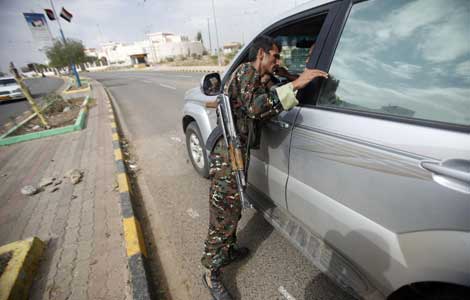Yemen enhances security over embassies
Updated: 2013-08-05 06:24
(Xinhua)
|
|||||||||||
|
 |
|
A police trooper inspects a car at a checkpoint near the British embassy in Sanaa August 3, 2013. [Photo/Agencies] |
Most of the roads leading to the foreign missions in Sanaa are blocked off on Sunday by heavy-armed troops. The main street in front of the Saudi embassy in Sanaa was completely closed by police forces. Tanks and trucks were seen deployed in the vicinity of the U.S. embassy.
"The U.S. drone was sent to monitor the areas surrounding the U. S. embassy in Sanaa," a Yemeni intelligence official told Xinhua by phone.
He said that there was no "specific threat," but there were terrorist threats inside Yemen as Ramadan marks the five anniversary of al-Qaida's deadly attack on the U.S. embassy in Sanaa in 2008 that killed more than 20 people.
"Al-Qaida in Yemen participated in planning and carrying out a terrorist operation that led to recent mass jailbreaks in the Arab country of Iraq, in which about 600 jailed suspected terrorists escaped," said the official, adding that "the men who led the operation in Iraq's jailbreaks were from the Yemeni southern province of Abyan and that al-Qaida has admitted that in its recent statements."
Washington's move to close its mission in Sanaa for a few days for security reasons has promoted Britain, Germany and France to do the same.
"We are already on high alert, and we have strengthened the standby mode," a soldier patrolling in a new checkpoint on a street leading to a foreign embassy told Xinhua.
Yemeni President Abd-Rabbu Mansour Hadi last month instructed security authorities to set up more security checkpoints in Sanaa after an Iranian diplomat kidnapped near his embassy.
The al-Qaida in the Arabian Peninsula (AQAP) on Thursday killed a Saudi employee of the Saudi embassy in Sanaa after they failed to kidnap him, according to a statement by the Yemeni Interior Ministry.
On Friday, the U.S. State Department issued a worldwide travel alert to U.S. citizens. "Current information suggests that al- Qaida and affiliated organizations continue to plan terrorist attacks both in the region and beyond, and that they may focus efforts to conduct attacks in the period between now and the end of August," it said.
Last week, the United States launched three deadly drone strikes in the southern Yemeni regions that killed several al- Qaida suspects, including four children.
The U.S. government stepped up drone strikes in Yemen since Hadi took office in February 2012, after a year-long unrest weakened the control of the central government and allowed the militants to take over swaths of territory in the south.
The Yemeni government managed to recapture several southern cities in May, 2012.
The Yemen-based AQAP, which is considered the most active terrorist network in the Middle East and major threat to U.S. interests in this region, was emerged in January 2009 after the merger of its Saudi and Yemeni branches.
Today's Top News
Shanghai probes sex claims against officials
Association urges Chinese to have a living will
US extends closure of embassies
New Zealand milk stokes fears
EU solar deal hailed as blueprint
Riding the clean energy boom today
Foreign investors welcome in Beijing
Bespoke shoes, Italian-style, made in China
Hot Topics
Lunar probe , China growth forecasts, Emission rules get tougher, China seen through 'colored lens', International board,
Editor's Picks

|

|

|

|

|

|





